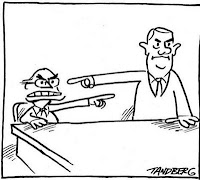Dear English Answer Man:
You're always telling students to defend their opinions. I think it's high time for you to stick your neck out. That's an idiom, if you didn't catch it. So, what are your thoughts on power? Does it screw up the world like every one says? Or do you actually have something new to say on the topic?
-Anonymous
Dear Anonymous:
Your arrogance is stunning. However, I will not be outdone. OF COURSE I have something brilliant and innovative to add to the discussion of power and corruption. I used to believe that absolute power corrupts, and power corrupts absolutely--you may have heard the old cliche.
But does it really?
Researchers have found that when people consider themselves to be more powerful, they are actually more productive and effective. They point out that it's not really that shocking--if people feel worthless and powerless, why should we be surprised that they don't perform well? (Go read the article--it's a bit brainy, but interesting.)
This is only one example in one setting, but the study definitely adds a new wrinkle to discussions about power and corruption. HOWEVER--Even if people are more effective when they have more power, that doesn't mean that they are not corrupt. Plenty of corrupt individuals are effective at what they do. That's what makes them so dangerous. Therefore, I must retain my believe that power corrupts, even if it does increase effectiveness.

